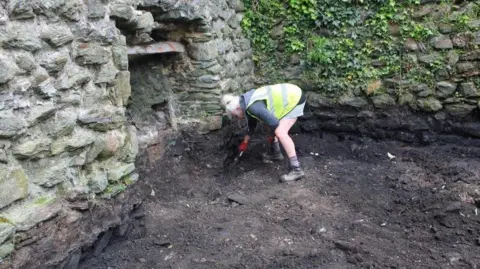Roman and medieval past unearthed in churchyard dig
 Heneb: Gwynedd Archaeology
Heneb: Gwynedd ArchaeologyParts of north Wales' Roman and medieval past are being unearthed at a chapel site in Holyhead.
Historical artefacts were discovered after planning permission was granted to transform the Grade II-listed Eglwys y Bedd building in St Cybi's Churchyard into a community hub.
St Cybi's was originally the location of a Roman fort and has been called “an extremely important and impressive” historic site by archaeologists.
The base of the Roman wall and graves dating back to the 1700s have already been uncovered.
“The Roman fort was built to defend the island from attacks by sea, probably from Ireland, in the late third to early fourth century,” said Jenny Emmet, senior planning archaeologist for Gwynedd archaeology group Heneb.
“St Cybi is thought to have founded a community of monks here in the sixth century and Eglwys y Bedd is thought to mark his original burial place."
The dig, which will go on for several months, has also brought to light the foot-worn stone threshold to the fort’s entrance, an early clay pipe bearing a Masonic symbol and pottery shards dating back to the 1800s.
An open day about the excavation will be held this weekend, with a pop-exhibition to follow.
